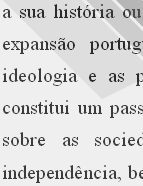

................................
In the extensive history directed by António Baião, which recorded the exaltation of the 'former' presence of the Portuguese in the Angolan region, resorting to heroes such as Paulo Dias de Novais and Salvador Correia de Sá, followed by the governors and their accomplishments, the history of 19th and early 20th century Angola, limited by censorship but also by the concept of history, did not emerge in an autonomous manner. It was, on the contrary, integrated into the thematic chapters devoted to overseas issues (abolition of the slave trade, the Berlin Conference, the European conflicts, scientific explorations, wars of conquest, confrontations with 'savage' populations, white colonisation), which summed up well the Portuguese ghosts and ideological directives.
Father Silva Rego's orientation also complied with this reading of history. The themes, problems, events and heroes were practically the same. But Rego tried to organise a theory capable of explaining both Portuguese sovereignty in Angola and Portuguese-African relations, classifying the Angolan system as a " Luso-African feudal regime".
In Silva Rego's view, the decisions arising from the Berlin Conference had disrupted Portuguese sovereignty, bringing negative changes to the relations maintained by this " sovereign country", thanks to the "vassalage treaties" with African chiefs. As a result, conflicts were fuelled between the "sobas [African chiefs], deeply divided among themselves as a result of tribal rivalries", turning them against the Portuguese authority, "the only cement that was slowly working on Angolan unity", establishing "order and discipline" and "civilisation and progress" in Angola (O Ultramar. ., 1969,XX,247-250).
Ralph Delgado's História de Angola [History of Angola] (1948) cannot be ignored given its importance in Portuguese historiography devoted to Angola. Written in Benguela as a triumphalist monument to celebrate the values of the three-hundredth anniversary of the colony's restoration, this work focuses on Angolan defeats to Portuguese military genius. Delgado dedicates it to his father, the first administrator of Bié, whose nationalist sentiment he could only extol (1948, I, “Dedicatória” ["Dedication"]). The ideological lesson is clear: only by associating in a double movement the familiar and the[Portuguese] national - Angolan values were only a minor variable in this situation - could a past be made known to justify the future.
